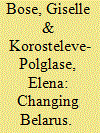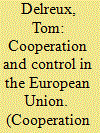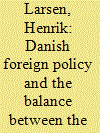|
|
|
Sort Order |
|
|
|
Items / Page
|
|
|
|
|
|
|
| Srl | Item |
| 1 |
ID:
089891


|
|
|
|
|
| Publication |
2009.
|
| Summary/Abstract |
Since the end of the Cold War, European Union (EU) efforts in transforming Central and Eastern Europe (CEE) have been enormously successful. The 2004 enlargement is widely regarded as the single most effective foreign policy strategy in the Union's history, and the recent European Neighbourhood Policy (ENP) was designed to repeat that success in countries located on the EU's new Eastern borders. Although the ENP has been the subject of substantive discussion in European academia, Belarus is the one country in Eastern Europe that has largely escaped scholarly attention.
|
|
|
|
|
|
|
|
|
|
|
|
|
|
|
|
| 2 |
ID:
090086


|
|
|
|
|
| Publication |
2009.
|
| Summary/Abstract |
Since the end of the Cold War, European Union (EU) efforts in transforming Central and Eastern Europe (CEE) have been enormously successful. The 2004 enlargement is widely regarded as the single most effective foreign policy strategy in the Union's history, and the recent European Neighbourhood Policy (ENP) was designed to repeat that success in countries located on the EU's new Eastern borders. Although the ENP has been the subject of substantive discussion in European academia, Belarus is the one country in Eastern Europe that has largely escaped scholarly attention. This article takes stock of recent developments in EU-Belarus relations and seeks to explain the very limited leverage of the EU over the country. We first examine the EU's relations with Belarus through the theoretical lens of external governance. By taking for granted the EU's ability to transfer its norms and values, however, the governance perspective does not account for the EU's very limited success in changing Belarus. We therefore revisit Michael Smith's notion of `boundaries of order' to highlight the impact of legal/institutional, transactional, cultural and geopolitical factors on EU-Belarus relations. We argue, in particular, that the existence and the construction of boundaries between the Union and its neighbouring states are essentially mutually constitutive processes. Besides shifting its own boundaries (and thereby extending its rules to outsiders), the EU is itself subject to the boundaries enacted by neighbouring states. In our conclusion, we juxtapose the notion of external governance as `rule transfer' with `partnership' as a more suitable mode of interaction between the EU and Belarus.
|
|
|
|
|
|
|
|
|
|
|
|
|
|
|
|
| 3 |
ID:
089896


|
|
|
|
|
| Publication |
2009.
|
| Summary/Abstract |
This article examines the internal decision-making process in the European Union when the EU participates in international environmental negotiations. More particularly, the practical functioning of the relation between the member states and the EU negotiator (i.e. the Commission, the Presidency or a lead country), representing the member states externally, is examined. Starting from principal-agent theory and based on empirical research on eight EU decision-making processes with regard to international environmental negotiations, the article argues, first, that control by the member states on the EU negotiator takes place most manifestly during the course of the international negotiations, and, second, that these ad locum control mechanisms perform not only a control function, but also a cooperation function.
|
|
|
|
|
|
|
|
|
|
|
|
|
|
|
|
| 4 |
ID:
089898


|
|
|
|
|
| Publication |
2009.
|
| Summary/Abstract |
In the international debate, it is often argued that Denmark, in its major foreign policy priorities, has sided with the United States (US) since the Cold War rather than with the European Union (EU) or its European partners. I examine whether this is correct, and if it is, why this is so, since 2001. I also ask whether a different theoretical approach, namely discourse analysis, would lead to findings different from those of the dominant approaches. I first present various ways of explaining why a country chooses the balance that it does between the EU and the US. One particular approach, post-structuralist discourse analysis, is applied. The balance between the EU and the US in the dominant Danish discourse is analysed. I outline the policy level and attempt to map where Danish policies are conducted with the EU and the US, respectively. I show that the EU is the most important partner across foreign policy areas since 2001, despite ad hoc foreign policy cooperation with the US, and that this is due to a dominant discourse articulating the EU as `our most important alliance'. However, the US is the most important partner on military security issues based on a discourse articulating cooperation with the US as a central part of Danish foreign policy identity and an `offensive foreign policy'.
|
|
|
|
|
|
|
|
|
|
|
|
|
|
|
|
| 5 |
ID:
089894


|
|
|
|
|
| Publication |
2009.
|
| Summary/Abstract |
The existence of the euro-area has lowered the costs emanating from the autumn 2008 financial crisis for weak euro-area economies. For the Scandinavian euro-outsiders, the financial crisis awoke a public discussion about the pros and cons of the euro. This is just natural in a situation of crisis. Owing to their good economic standing, however, the Scandinavian euro-outsiders have not, on the whole, been worse off outside the euro-area than EU member states inside it. One reason may be the level of micro-innovation. Over the past 10 years, a considerable amount of experience has been accumulated among the euro-outsiders. Innovative ways have been found to compensate for non-membership of the euro-area. In fact, it seems as if the special status of the semi-permanent euro-outsiders, such as Denmark and Sweden, initially has worked as a catalyst for innovation among civil servants and other stakeholders, thereby contributing to innovation in the entire public sector in these countries. Somehow this stands in sharp contrast to the reform rhythm among the euro-insiders.
|
|
|
|
|
|
|
|
|
|
|
|
|
|
|
|
| 6 |
ID:
090074


|
|
|
|
|
| Publication |
2009.
|
| Summary/Abstract |
Since its creation in 1999, the European Security and Defence Policy (ESDP) has evolved rapidly. This new policy area presented Sweden, once a neutral state, with a challenge to its security policy tradition. In responding to the challenge, the Swedish government was initially reluctant about the ESDP, but today has become one of its staunchest supporters and active members. In this article, I examine Swedish participation in the ESDP since its inception, i.e. the impact Sweden has had on the ESDP, but also the extent to which the ESDP has influenced Swedish security policy. Furthermore, I seek to shed light on why the Swedish government has become so active and supportive of the ESDP despite initial reluctance. Drawing on Reuben Wong's multidimensional model of Europeanization and new research undertaken primarily through interviews with key officials, I argue that Sweden has embarked on a journey from sceptical and hesitant participant to one of its main driving forces. Although the ESDP has had a major influence on Swedish security policy, I argue that the Swedish government has had a major impact on shaping the current character of the ESDP. I point to an interwoven relation between European and domestic levels, thus confirming the bi-directional character of the process of Europeanization.
|
|
|
|
|
|
|
|
|
|
|
|
|
|
|
|
| 7 |
ID:
089889


|
|
|
|
|
| Publication |
2009.
|
| Summary/Abstract |
Since its creation in 1999, the European Security and Defence Policy (ESDP) has evolved rapidly. This new policy area presented Sweden, once a neutral state, with a challenge to its security policy tradition. In responding to the challenge, the Swedish government was initially reluctant about the ESDP, but today has become one of its staunchest supporters and active members. In this article, I examine Swedish participation in the ESDP since its inception, i.e. the impact Sweden has had on the ESDP, but also the extent to which the ESDP has influenced Swedish security policy. Furthermore, I seek to shed light on why the Swedish government has become so active and supportive of the ESDP despite initial reluctance. Drawing on Reuben Wong's multidimensional model of Europeanization and new research undertaken primarily through interviews with key officials, I argue that Sweden has embarked on a journey from sceptical and hesitant participant to one of its main driving forces. Although the ESDP has had a major influence on Swedish security policy, I argue that the Swedish government has had a major impact on shaping the current character of the ESDP. I point to an interwoven relation between European and domestic levels, thus confirming the bi-directional character of the process of Europeanization.
|
|
|
|
|
|
|
|
|
|
|
|
|
|
|
|
|
|
|
|
|